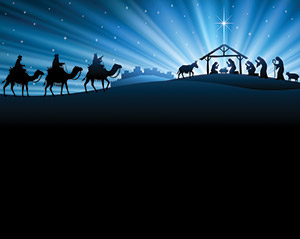What is Epiphany? Epiphany is a celebration in the Christian liturgical year occurring Jan. 6.
Every year, Christians celebrate the “A-Team” church holidays—Christmas and Easter. Nothing is on par with those two.[1]
Then there are the sort of “B-Team” holidays. Some churches get excited about Pentecost, Ash Wednesday, or the events of Holy Week, and some have mixed feelings about less liturgical (or non-liturgical) events like Thanksgiving or Halloween.
Finally, there are the “C-Squad” events—the holidays people aren’t really that sure about. Christ the King Sunday. Trinity Sunday. Redemption Sunday. All Saint’s Day. Ascension Day. These holidays are so minor to most of us might not have noticed which one of them I just made up.
Epiphany, for many Christians, is on the C-squad. Despite vibrant celebrations in some traditions, to others, Epiphany is more of a mystery than anything else.
Over the last few years, Pittsburgh Seminary has gathered some resources to help de-mystify Epiphany, so I wanted to take a moment to gather them all in one place as you consider the question, “What is Epiphany?”
What is Epiphany? The Festival of Theophany
In some traditions, Eastern traditions in particular, the festival that occurs at the same time as Epiphany is actually referred to as Theophany, and is a celebration of the Trinity. This approach often focuses on the Baptism of Christ. New Testament professor Edith Humphrey considers this celebration from her experience in the Orthodox tradition in her reflection “Worship of the Trinity was Made Manifest.”
What is Epiphany? The Visit of the Magi
For many of us, the celebration of Epiphany is most closely linked with the three wise men. This is an ancient tradition with deep roots in the arts. Dr. Karen Bowden-Cooper, former curator of the Kelso Museum, traces the development of artistic portrayals of the wise men in her e-book A Journey with the Magi.
PTS produced its own artistic take on this celebration in the form of a short video combining visual art with ancient legends. Watch the “The Story of the Magi” on the Seminary’s YouTube channel.
If you’re the kind of person who prefers to read the book instead of see the movie, you can skip the audio and just read the text of the Legend of the Magi. There’s also an Epiphany lesson plan to accompany the video if you’d like to use it with a Bible study or class.
What is Epiphany? A Bridge from Christmas to Ordinary Time
After Advent, Christmas Eve, Christmas Day, New Year’s Eve, and New Year’s Day, it can be tough to transition back to ordinary life. Some people use it as a marker to take down the Christmas decorations or to start up normal routines again.
Dr. John Burgess, professor of theology at PTS, discusses this transition in his sermon “Light of Light.” He looks at a passage from Ephesians and considers the significance of Christmas lights in particular.
Kendra Smith, the Seminary’s worship coordinator, also reflects on the transition back to ordinary life in her sermon “Epiphany Experience.”
What is Epiphany? A Time to be Creative
Let’s face it. People have specific expectations from their preacher during the month of December – more so than just about any other time during the year. But January is a different story.
For Epiphany, people are pretty open to different passages or ideas. Even if your church has strong traditions, people may be open to discussing the different ways other churches observe the holiday.
I had some fun preaching on Epiphany at Pittsburgh Seminary by exploring some strange legends and mysterious creatures that are connected to the Magi, if only tangentially. Check it out by reading and listening to the sermon “Gold, Frankincense, and Myrrh.”
What is Epiphany? It’s lots of things!
This brief cartoon highlights several of the ways we celebrate Epiphany. It only takes a couple minutes of your time, and gives a quick, broad overview of the celebration.
If you’d like a little more depth, check out the Miller Summer Youth Institute’s Epiphany Resource Kit. It includes liturgical aids, lessons, and Bible studies about the various approaches people take to Epiphany.
[1] At least in how we observe them, naturally the actual significance of various feasts, festivals, and holidays is a matter of some debate, but that’s another blog post for another day (and another author)!
The Rev. Derek Davenport ’05/’17 is a PTS alumnus of the Master of Divinity (MDiv) Program and Master of Sacred Theology (ThM), between which he served at a church in Orlando, Fla., for five years. Derek also participated the Seminary’s Miller Summer Youth Institute. He serves as a preacher in Western Pennsylvania, researches church symbolism on his website, and tweets at @DerekRDavenport.

